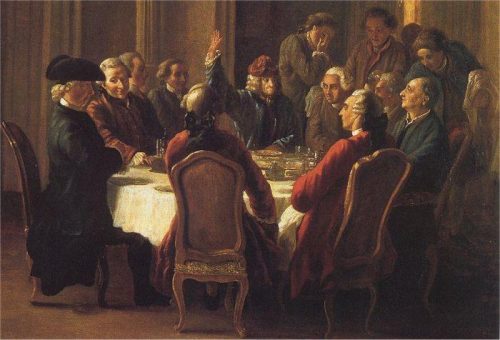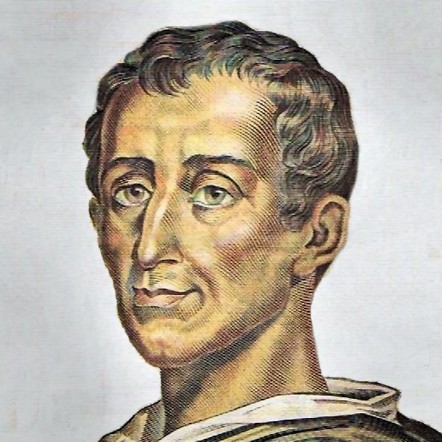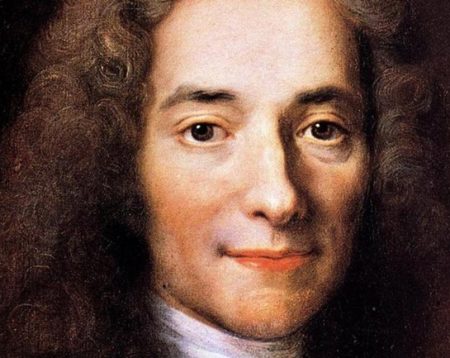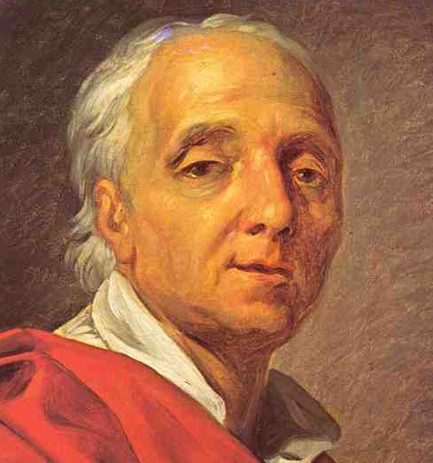
The philosophes (French for ‘philosophers’) were writers, intellectuals and scientists who shaped the French Enlightenment during the 18th century. The best known philosophes were Baron de Montesquieu, Voltaire, Jean-Jacques Rousseau and Denis Diderot. Other lesser-known figures included the mathematician and political scientist Nicolas de Condorcet, religious critic Nicolas Boulanger and atheist writer Jacques-Andre Naigeon.
Impact on revolution
philosophes had on the French Revolution is open to debate, though most historians agree it was substantial.None of the philosophes were revolutionaries and very few advocated or even predicted a revolution. Indeed, most were intellectual elitists with little regard for the common people, believing they had little or no role in government. Most of the significant philosophes were also dead long before 1789.
Nevertheless, their writings and ideas, particularly their political theories and criticisms of the Ancien Régime, helped to create an environment where revolutionary ideas could germinate and prosper.
Montesquieu
Charles de Secondat, Baron de Montesquieu (1689-1755) was an enlightened nobleman turned political philosopher, responsible for articulating a clear explanation of the separation of government powers.
Montesquieu was born into a noble family near Bordeaux in January 1689. Several of his relatives were involved in provincial politics, so the teenage Montesquieu also developed an interest in law and government. The family’s wealth gave him the opportunity to read, write and socialise.
The young Montesquieu became a vocal and charismatic regular in the Paris social set, where he spoke freely and critically about the Ancien Régime. He also travelled widely in Europe, observing and studying different forms of law and government.

By his late 20s, Montesquieu had worked as a lawyer, an academic and a history lecturer. He also began writing in earnest. His first significant public work was Persian Letters (1721), which satirised many aspects of French society.
Montesquieu’s views on government
His early writings reveal Montesquieu as a liberal, a deist and a supporter of constitutional monarchy. He was less receptive to republicanism or democracy. Like other intellectual giants of his age, Montesquieu believed government was best left to educated and enlightened elites. Common people, he argued, were too shiftless and poorly equipped to discuss either law or the business of government.
Montesquieu also believed that political systems must be organised so that those in government could not accumulate or abuse power. He expanded on this point in his best-known work, De l’Esprit des Lois (‘The Spirit of the Laws’), which was published anonymously in 1748. The Spirit of the Laws compared different systems of government, with a particular focus on how each system protected individual liberty.
Expanding on ideas previously explored by the English philosopher John Locke, Montesquieu decided the best means of protecting individual liberty was through the separation of government powers. The different functions of government – executive or monarchical, legislative and judicial – must be carried out by different people and different departments. The power of each branch of government must be limited, ideally by a constitution.
The Spirit of the Laws was despised by the church and placed on its list of prohibited books, however it proved very popular and sold thousands of copies across Europe. Montesquieu died seven years after the first edition, however The Spirit of the Laws became arguably the most significant work of Enlightenment political theory, shaping the outcomes of the American and French revolutions.
Voltaire

Voltaire was the pen name of the French writer Francois-Marie Arouet (1694-1778). He was born in Paris to a moderately wealthy family, the son of a government official. Arouet received a Jesuit education in Greek, Latin and the law. A free-spirited character in his youth, at age 20 Arouet attempted to elope with a young French émigré but the plot was discovered by his father.
After arriving back in Paris, Arouet spent a year imprisoned in the Bastille for writing libellous poems about members of the aristocracy. Around this time he adopted the pen name Voltaire, a Latinised anagram of his real name.
While detained in the Bastille, Voltaire penned Oedipus, a tragic play that hints at sexual debauchery and incest among members of the French aristocracy. Oedipus was a literary and dramatic success, later performed to packed houses in Paris, while Voltaire adopted writing as his profession.
Voltaire and England
In 1726 a lettre de cachet was issued against Voltaire. Rather than face another long stint in the Bastille Voltaire went into voluntary exile in England, where he remained for three years.
During his stay, Voltaire became fascinated by English society, government and law. He came to admire English literature, particularly Shakespeare; its constitutional monarchy; its freedom of speech and the press, particularly the open criticism and mockery of political figures in London newspapers and pamphlets.
Voltaire returned to France in 1729 and published Letters on the English Nation. It caused considerable controversy in France, comparing the English system with the French system and finding the latter wanting. Voltaire was particularly severe on organised religion, which did not dominate or define English society as it did in France.
“Voltaire was essentially a crusader like [Martin] Luther, always stronger in destruction than in positive construction. He was, says one historian, “the Spirit of the Enlightenment incarnate, with all its virtues and all its faults. Everything he said and wrote was as stimulating as the coffee on which he lived”.”
Frederick Artz, historian
Voltaire’s writing
Voltaire continued to write prolifically and in a range of formats, producing novels, novellas, essays, plays, satires and open letters. He could write in many voices, with profound seriousness, great subtlety or clever wit – or he could pour scorn and vitriol on his targets.
Politically, Voltaire was no democrat. He had no faith in the ordinary people, who he considered apathetic and too concerned with trivialities. Generally liberal in his views, Voltaire was an advocate for individual freedom, informed choice and religious tolerance.
Throughout his life, Voltaire was a fierce critic of the Catholic church, condemning its endemic corruption and the greed and depravity of high ranking clergymen. He wrote sourly about the church’s vast land holdings and the large tithes it imposed on the struggling peasantry. He condemned venality in the church, criticising the practice of nobles buying positions in the clergy, and complained about the Vatican intervening in French civil matters.
Supporters of the church damned Voltaire as a heretical atheist but like many other philosophes he was a deist, meaning he believed in a more constrained and less interventionist form of God.
Rousseau

Jean-Jacques Rousseau (1712-1778) was another Enlightenment writer whose political and philosophical ideas shaped the French Revolution.
Rousseau was born in Switzerland to a successful middle-class family. His mother died a few days after Rousseau’s birth; his father was a third generation watchmaker. The young Rousseau was raised around craftsmen and artisans. He became an avid reader, though he had little in the way of formal education.
Rousseau spent most of his 20s travelling, working a variety of menial jobs while studying and educating himself. In his 30th year, he moved to Paris, where he later befriended fellow philosophe Denis Diderot and had an article published in Diderot’s famous Enlightenment work Encyclopédie.
Rousseau’s political views
Much of Rousseau’s writing was undertaken in the last two decades years of his life. He wrote on a broad range of topics and addressed many social, political and philosophical issues.
Rousseau’s 1755 work Discourse on Inequality offers Rousseau’s ideas about why individuals live in and tolerate profoundly unequal conditions, particularly in civilised societies. One of his most famous works was Emile (1762), a novel that explores the nature of education and the corrupting influences of society on young individuals.
Probably Rousseau’s most significant contribution to Enlightenment political theory was his 1762 work The Social Contract. In this book, he made a simple but now famous statement: “Man is born free, yet everywhere he is in fetters [chains]”.
Rousseau pondered why people voluntarily submitted to the rule of kings and governments, surrendering their freedoms and liberties in the process. The answer, he concluded, was that humans are essentially good and desire peace, stability and good order. Civilised human society cannot exist without government and laws to keep order.
“That crowd of obscure writers and idle men of letters who devour the substance of the state to no benefit whatsoever… they smile disdainfully at those old words ‘patrie’ and ‘religion’ and devote their talents and their philosophy to destroying and debasing all that is sacred among men. Not that they hate either virtue or dogmas; they are enemies of public opinion, and banishing them among atheists would be enough to bring them back to the foot of the altars.”
Rousseau on political pamphleteers
During this exploration, Rousseau articulated the idea of the ‘social contract’, an unwritten agreement that exists between governments and individuals. He also articulated the concept of popular sovereignty, suggesting that the true power of government was derived from the consent of the people.
Popular sovereignty was a critical idea that was used to justify the American and French Revolutions. Many revolutionaries embraced Rousseau’s belief that political systems, while never perfect, must strive to progress and improve.
One of Rousseau’s more contentious claims was that private property was an impediment to good political leadership. Property interests, Rousseau suggested, distracted politicians from their primary roles: representing the people and ensuring morality. Rousseau also advocated the concept of a civic religion, a religion to worship God and uphold morality rather than served vested interests.
Diderot

Denis Diderot(1713-1784) was another prominent figure of the French Enlightenment. The son of a cutlery maker, Diderot was born in Champagne, northern France. He received a Jesuit education and moved to Paris with the intention of joining the clergy, before choosing to study law instead.
Soon after, Diderot turned to writing. He spent his early years undertaking small writing and translation jobs and filling clerical positions. His lack of connections prevented Diderot from obtaining any significant writing roles and, as a consequence, he was frequently broke.
Among his early writings were a history of Greece, an anthology of short stories and essays containing criticisms of the Catholic church. One of Diderot’s essays was condemned as heretical and in 1749 he was arrested and imprisoned for several months.
“It has been said that we are all born equal, but this is not so… Among men there is an original inequality that nothing can resolve. It must last forever. All that one can obtain from the best legislation is not to destroy this inequality, but to prevent abuses arising out of it.”
Denis Diderot
The Encyclopedie
Diderot’s most famous literary contribution was Encyclopédie. Commenced in 1750 but not completed until 1772, Encyclopédie was an ambitious project that aimed to gather and organise all of the world’s essential knowledge.
When completed, Diderot’s work contained hundreds of articles and essays across a myriad of subjects, including the physical and natural sciences, mathematics, astronomy, religion, theology, history, politics, society, literature, music and the visual arts. Unlike other books of its kind Encyclopédie also contained entries on artisanship and work, covering fields like farming, architecture, engineering, carpentry, masonry and manufacturing. The articles in Encyclopédie were written by dozens of well qualified experts and philosophes, most of whom were politically progressive.
While Encyclopédie was not itself a political text, some of its entries contained implied criticisms of traditional beliefs. Moreover, making knowledge available to everyone helped to undermine the authority and dominance of both France’s absolutist monarchy and the Catholic church. Encyclopédie was published openly in France until 1759 when it was outlawed, mainly at the behest of the church.

1. The philosophes were writers and intellectuals of the French Enlightenment, whose writings contributed to revolutionary ideas and criticisms of the Ancien Régime.
2. Baron de Montesquieu was a political theorist whose 1732 book The Spirit of the Laws articulated and popularised the idea of the separation of government powers as a means of preventing tyranny.
3. Francois-Marie Arouet, or Voltaire, was a prolific writer on a range of subjects. Voltaire was particularly known for his criticisms of organised religion and his condemnations of its venality and corruption.
4. Jean-Jacques Rousseau was a Swiss philosopher whose writings focused on education, government and natural rights. Rousseau is best known for developing the theory of a ‘social contract’ between individuals and their government.
5. Denis Diderot was a French writer who compiled the Encyclopédie, an Enlightenment text that assembled all existing human knowledge and made it available to all, undermining the authority of the monarchy and the Catholic church.
Citation information
Title: ‘The philosophes‘
Authors: Jennifer Llewellyn, Steve Thompson
Publisher: Alpha History
URL: https://alphahistory.com/frenchrevolution/philosophes/
Date published: September 26, 2019
Date updated: November 7, 2023
Date accessed: April 30, 2024
Copyright: The content on this page is © Alpha History. It may not be republished without our express permission. For more information on usage, please refer to our Terms of Use.
